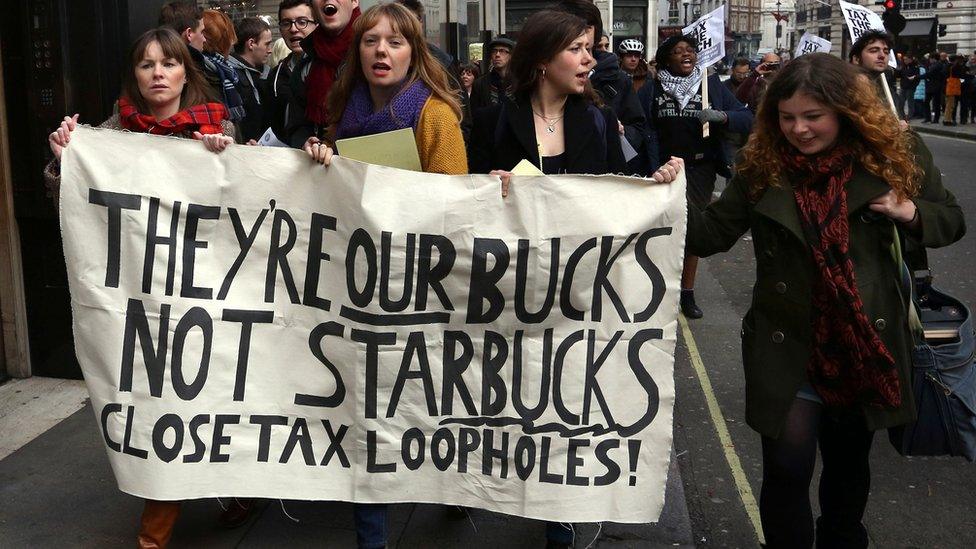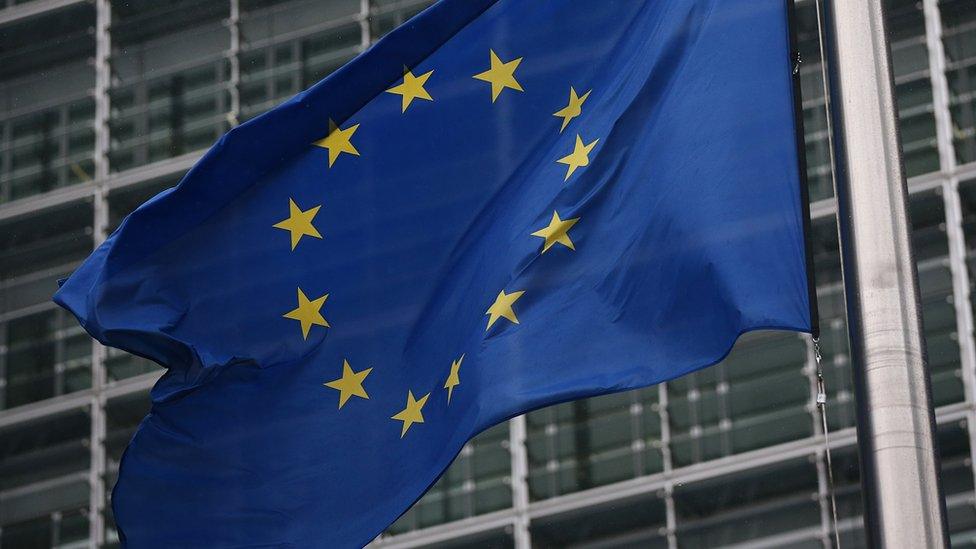EU seeks more tax details from big firms
- Published

The tax arrangements of multinationals such as Starbucks have caused widespread protest
The European Union has unveiled plans to force large companies to disclose more about their tax affairs.
They will have to declare publicly how much tax they pay in each EU country as well as any activities carried out in specific tax havens.
The rules on "country-by-country reporting" would affect multinational firms with more than €750m in sales.
The plans come amid heightened scrutiny of the use of tax havens following the Panama Papers revelations.
And it follows increasing pressure on multinationals such as Starbucks and Google to pay more tax in the countries where they operate.
More than 6,000 of the world's biggest companies will be covered by the proposals, representing approximately 90% of the turnover of all multinationals, a third of them with their headquarters in the EU.
It is estimated, external that EU states lose at least €50-70bn (£40-56bn; $57-80bn) each year to corporate tax avoidance.
Under the proposals multinationals would have to disclose for each country within the EU:
The nature of the activities, and the number of employees
The total net turnover, including turnover made with third parties and between companies within a group
The profit made before tax
The amount of income tax due, and the tax paid.
Multinationals will also have to report how much tax they paid in tax havens, or what the EU calls "jurisdictions that do not abide by tax good governance standards".
What is being done to tackle tax-dodging?
The Prime Minister's official spokeswoman said: "We welcome the proposals coming out from the European Commission today, which will further enhance our ability to make sure that companies are paying taxes owed."

Transparency
The rules will not apply to companies' other activities outside the EU.
But the European Network on Debt and Development, an association of trade unions and non-governmental organisations, says companies should be forced to adopt country-by-country reporting for inside and outside the EU.
In a letter to the European Commission President Jean-Claude Juncker, the association said multinationals should also publish more information: "The proposal... would effectively allow multinationals to continue shifting their profits out of the EU while still keeping citizens in the dark.
"It would also make the measure useless for developing countries as they would not be able to get any country-specific information."
An EU source said that getting the rules applied outside the EU would be politically impossible. She said: "We'd never get [that] passed. We need it to have political backing."
More information
Lord Hill, the EU's financial services commissioner, said: "The main risks of having disaggregated information outside the EU is that businesses in other jurisdictions could get important business data on European businesses that they could use to their competitive advantage, and third-country tax jurisdictions might see information that could lead them to double-tax firms.
"Our economies and societies depend on a tax system that's fair, a principle that applies both to individuals and to business.
"Yet today, by using complicated tax arrangements, some multinationals can pay nearly a third less tax than companies that only operate in one country.
"The Panama Papers have not changed our agenda, but I think that they have strengthened our determination to make sure that taxes are paid where profits are generated."

Media doubts, by BBC Monitoring
German and French press pundits have cast doubt on the potential impact of the EU proposals.
Les Echos business daily, external Brussels correspondent Renaud Honore says the Panama Papers row prompted Brussels to "revise its ambitions upwards", but reports that some in the Commission worry about a "certain coolness" from France.
Edouard Pflimin in centre-left Le Monde, external agrees that the Panama Papers have "piled the pressure" on Europe to "combat the scourge of multinationals' fiscal opacity".
In Germany, the EU proposals attract less attention than Finance Minister Wolfgang Schaeuble's own 10-point plan for tackling tax havens.
Munich's liberal Sueddeutsche Zeitung, external thinks his measures - like those of the European Union - are "well-intentioned, but capable of solving only part of the problem".
It sees a "conflict of interest" arising over the amount of "dirty money" that enters the German economy each year, and notes that the stringent Mr Schaeuble's proposals would lead to Britain being classed as a tax haven.
Dorothea Siems, the economics correspondent of the conservative Die Welt, external, thinks the proposals are an over-reaction, given that few German names have cropped up in the Panama Papers.
"Privacy must be respected in dealing with wealth issues. It is up to the state to prove that a crime has been committed, not for citizens to prove their innocence," she concludes.